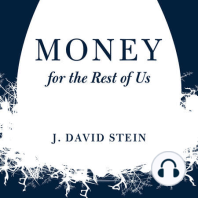25 min listen
Is Investing More Like Poker or Chess?
ratings:
Length:
30 minutes
Released:
May 2, 2018
Format:
Podcast episode
Description
#203 How to make better investing and life decisions. More information, including show notes, can be found here.Episode SummaryDavid asks the question, “Is investing more like poker or chess?” on this episode of Money For the Rest of Us in order to help you better understand why investing is inherently unpredictable. The book, “Thinking in Bets: Making Smarter Decisions When You Don’t Have All the Facts” by Annie Duke inspired this episode. David ponders big ideas such a reflexive vs. deliberative thinking and why the differences between causation and correlation must be considered. If you’ve ever wondered about how to improve your investing decisions while combining analytical research with skilled intuition, this episode will answer many of your questions.Investing and life are like poker – not chess!Many investors approach financial decisions like a game of chess, where there are correct and incorrect moves. However investing, and real life, are more closely related to poker, a game of uncertainties. Duke explains in her book that a term known as “resulting” drives poker games. “Resulting” is the belief that the quality of a decision affects the quality of the outcome. However, David explains that a great decision is a result of a great decision-making process, regardless of the end outcome. Learn how to improve your decision-making process by listening to this episode.Don’t assume causation when there’s only correlationOne of the biggest threats to a good decision making processes it the belief that there is always a direct causation linking the process and the end result. Even with the best knowledge and highest levels of skill, investing still contains an element of uncertainty. Sometimes there aren’t any connections between the decisions investors make and the end goal. For example, if you purchase a house, fix it up, and sell it 3 years later for a 50% profit, does that make you great at real estate investing? Maybe. But it could also have been a result of an overall uptick in the housing market, and any buy/sell transaction would have been profitable. David wants his listeners to know that correlation between good investing decisions and profitable outcomes do not always mean the same result will occur.How can you improve the quality of your investing decisions?Since investing is strongly related to the uncertainties and variables found in a game of poker, there are never surefire ways to ensure every decision will be profitable. But there are ways to increase your chances of succeeding. Duke explains that “The quality of our lives is the sum of our decision quality plus luck.” Investors can enhance their decision-making skills by considering market trends and understanding that no one knows for sure what market variables are going to do. David shares more tips for improving the quality of your investing decisions on this episode.Deliberative thinking vs reflexive thinking and the idea of wu-wei in investingDavid outlines two main patterns of thought on this episode: reflexive (fast) and deliberative (slow). Responsible investors utilize both methods on a continual basis. Always reacting to the market and going off of intuition is not a sustainable way of making investing decisions. However, utilizing only deliberative thinking could result in missed time-sensitive opportunities. That’s when the idea of wu-wei comes into play. David explains that wu-wei is “A state of perfect equanimity, flexibility, and responsiveness that is unrestrained by the conscious mind because it does not attempt to predict variables.” Essentially, it’s the idea of embracing the unknown and keeping the balance between fast and slow thinking.Episode Chronology[0:57] Is investing more like poker or chess?[7:02] Investing, and life, are like poker – not chess[12:05] Don’t assume causation when there’s only correlation[13:38] How do we improve the quality of our investing decisions?[18:45] 2 ways of thinking about investing: fast & slow[23:00] Th
Released:
May 2, 2018
Format:
Podcast episode
Titles in the series (100)
Why You Should Care About the Economy by Money For the Rest of Us
